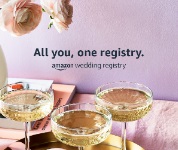
Bowen Kim launched misomomo in 2022
with one goal in mind: to spread positivity and queer joy. Since then,
the online retailer has reached customers from around the globe with
its cheerful collection of LGBTQIA+ pins, earrings, hats, patches, and stickers.
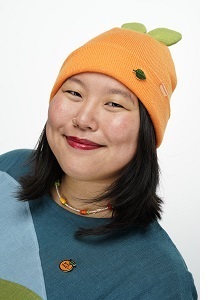 The LA-born entrepreneur proudly describes her solo operation as "queer
and Korean-American owned," emphasizing that her business is a labor of
love rooted in a desire to promote inclusivity and celebrate
identity--especially in the Asian-American community.
The LA-born entrepreneur proudly describes her solo operation as "queer
and Korean-American owned," emphasizing that her business is a labor of
love rooted in a desire to promote inclusivity and celebrate
identity--especially in the Asian-American community.
"But anything that helps me express myself or just makes me smile is
fair game," says Kim, who changed her name to Bowen--Bo for short--and
uses she/they pronouns.
Now based in New York City, Kim designs and curates every item on the
site--then ships each order herself using environmentally conscious
packaging. That's pretty impressive, considering that Kim has an
economics degree and no formal art training.
"I've always loved drawing, art, and design, and I've always had a
creative streak," she says.
Much of misomomo's collection features enamel pronoun
and rainbow
pride pins, including a She-Ra
Sword Pride Pin, inspired by Kim's love of She-Ra and the
Princesses of Power, a Netflix animated series with a lesbian
protagonist.
We spoke to Kim about entrepreneurship, coming out, and the importance
of representation for queer Asians.
What's the bestseller on your site?
My
pronoun pins are definitely a bestseller, and I'd say my customers
are mainly queer people from English-speaking countries around the
world. I've truly enjoyed making what I like to think of as "small
tokens of queer cheer."
Do your customers tell you that your creations bring them joy?
One of my favorite customer interactions was chatting with a young
non-binary person who was buying a they/them pronoun pin for their
mother, who was also exploring their gender identity and experimenting
with using different pronouns.
I've also provided pronoun pins as wedding favors for a queer wedding,
and I love that idea so much. It's been extremely heartwarming to see
so many customers buying pronoun pins as gifts of solidarity and
support for their friends and family members. That message of "I see
you and support you" is so special and important.
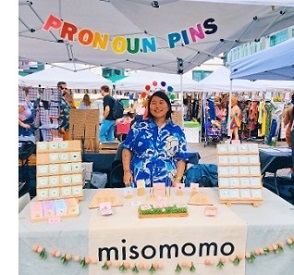 What other messages do you hope your artwork conveys?
What other messages do you hope your artwork conveys?
I gravitate towards making designs that help me express elements of my
identity and generally just set out to make things that make me happy.
While queerness and identity are favorite themes that I explore, some
of my products are purely for fun, like my frog pins and my orange
beanies with the little leaves on top. Products like these may not be
directly related to my desire to spread queer cheer, but I love how
much fun I have designing and wearing them, and seeing others share a
smile when they first see my designs.
I see that you offer exchanges for people who change their pronouns.
Why is it important?
I'm thrilled to offer free exchanges for pronoun pins when people's
pronouns change. I've gone through multiple iterations of pronouns
before landing on she/they as a comfortable fit for me--most of the
time. It's completely normal for people's gender expression and
pronouns to change over time as they explore their identities and
figure out what feels right to them.
I want my business to acknowledge that changing pronouns can be part of
the process of learning about yourself. Some people also have more
flexible gender identities or expressions, and may even opt to use
different pronouns daily, but these folks generally just purchase a few
different pins to cycle through. While pronoun pin exchanges are rare,
offering that option is very important to me.
What inspired you to start misomomo?
I originally had a specific vision of an enamel pin that I wanted to
buy (a rainbow She-Ra
sword pin), but I couldn't find one that I liked so I decided to make
my own. I figured that maybe other fans of the show would like them,
too, so I listed them for sale online. When I went looking for a leaf
pronoun pin--and again couldn't find one that I liked--it became
misomomo's second enamel pin design.
How difficult was it to get your company off the ground?
Etsy and Instagram definitely
helped. These days I prefer selling directly to customers via my website, but it can be extremely
difficult to find and reach an audience and build trust with customers
when starting a business from scratch. Starting on Etsy allowed me to
test the concept and see if people were interested in products like
mine.
I'm sure you're a role model to queer
Asians--as an artist, entrepreneur, and in so many other ways.
Growing up, I had few examples of entrepreneurs who looked like me, or
that I could relate to, and I would have struggled to even consider it
a viable life path. It's much easier now to find and reach the
communities that I'm seeking out, as there's a much greater awareness
and acceptance around queerness
and diversity, and more accessibility and availability of resources and
community.
Do you feel like it's important to
educate people about gender identity now more than ever?
U.S. politics being what it is today, it feels more important than ever
to try to spread more queer and Asian joy and expression into the
world. At a time when it feels like small businesses everywhere are
struggling--and queer communities and resources are under threat--it
can be extremely difficult to plan for the future and remain positive
and engaged, but my business also grounds me with a sense of purpose
and agency.
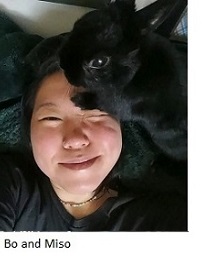 Where did the name misomomo come from?
Where did the name misomomo come from?
Misomomo was originally a placeholder name. Miso was my pet rabbit. She
died in 2023, but was, and continues to be, a huge inspiration. Momo
was my childhood dog, who I was also extremely attached to.
I enjoy exploring themes of identity and duality in my art, and the
name Misomomo represents how my childhood and heritage combine with my
experience of moving away from home and coming into my own as an adult
to form my worldview and identity. My company is the expression of my
desire to connect with others who may share aspects of that identity
and to help people feel seen and express themselves.
Why did you change your name?
I
changed my first name from Maria to Bowen in 2022. I'd always wanted to
change my name growing up, because "Maria" never felt like "me" and I
didn't like the religious significance of the name. When I started
experimenting with different pronouns and gender expressions, I decided
that it was also time to change my name to one that felt like a better
fit. It took some getting used to, of course, but now I feel as though
I've always been Bo. I've never felt more "me" before.
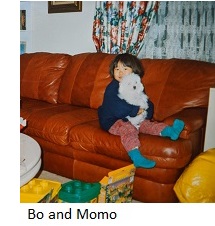 When did you realize you were queer?
When did you realize you were queer?
I had a bit of a queer awakening during the pandemic,
and I'd recently come out as non-binary.
I didn't realize I was queer until I moved away from home and had the
space to challenge my own preconceptions about who I was "allowed" to
be and who I actually am. Once I was living on my own in New York, I
gradually came to recognize and accept the feelings and desires I've
always had. Finding queer communities and consuming queer art and media
--like She-Ra!--really opened my eyes to consider what I wanted from my
own life.
How did your parents react when you told them?
I'm actually still not out to my parents, with whom I have complicated
relationships. My parents and family were strict, religious Koreans.
I'd never felt so seen by a movie before seeing Everything Everywhere All At Once.
Instead, I focus on my relationships with my siblings, who are also
queer, and my found family.
Are there any plans to expand your line?
I'd love to expand and offer more apparel and accessories. I'm always
overflowing with ideas for new designs; I keep a long list of new
design ideas. I like to start from a place of "What is my ideal version
of this product?" and then work to make that idea a reality. I'd love
to come up with a fruit-sticker-inspired design, maybe pronoun fruit
sticker pins. I also enjoy branching out to different types of
products, like selling beanies and luggage tags. I'd love to explore
magnets, stationery, and more wearable accessories. Expect to see more
queer, Asian, and generally cheery product concepts from me.
_______________________________
*Edited for length and clarity
Photo: Images provided by Bowen Kim and misomomo
‘I Am Going Through Hell’: Job Loss, Mental Health, and the Fate of Federal Workers
by Rachana Pradhan and Aneri Pattani
Jade Pieces: Jet-Set Ready TSA-Friendly Toiletries
Picture This: Asian Food Facts
Our Top Three Must-See Videos
by AP Crone
How to Report Hate Crimes Against AAPIs
Who, What, Where and How: AAPI Organizations

